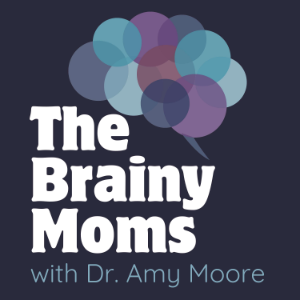
The Brainy Moms
Kids & Family Podcasts
The Brainy Moms is a parenting podcast with smart ideas to help moms and kids thrive! Hosted by cognitive psychologist Dr. Amy Moore along with rotating co-hosts Sandy Zamalis, Teri Miller, and Dr. Jody Jedlicka, this weekly show features conversations about parenting, psychology, child development, education, and medicine with practical tips to help moms navigate the ups and downs of parenthood. We're smart moms helping make moms smarter...one episode at a time! Find us at www.TheBrainyMoms.com and on social media @TheBrainyMoms
Location:
United States
Genres:
Kids & Family Podcasts
Description:
The Brainy Moms is a parenting podcast with smart ideas to help moms and kids thrive! Hosted by cognitive psychologist Dr. Amy Moore along with rotating co-hosts Sandy Zamalis, Teri Miller, and Dr. Jody Jedlicka, this weekly show features conversations about parenting, psychology, child development, education, and medicine with practical tips to help moms navigate the ups and downs of parenthood. We're smart moms helping make moms smarter...one episode at a time! Find us at www.TheBrainyMoms.com and on social media @TheBrainyMoms
Twitter:
@thebrainymoms
Language:
English
Contact:
7192131052
Website:
http://www.brainymoms.co/
Email:
dramy@brainymoms.co
Self-Harm In Teens: Advice for Parents Navigating Non-Suicidal Self Injury | Stacy Schaffer
Duration:00:45:05
Gaslighting, Narcissism, and Other Teen Buzzwords: A Therapist's Guide for Parents | Stacy Schaffer
Duration:01:00:10
Raising Career-Ready Kids | Dr. Tega Edwin
Duration:00:48:54
From Cancel Culture to Kitchen Tables: A Parenting, Family Values, and Weight Loss Discussion with Matty Lansdown
Duration:01:09:02
Your Child Deserves a Learning Path as Unique as They Are | Matt Bowman
Duration:00:53:21
Present, Not Perfect: How to Support Your Teen's Mental Health Journey | Jenn Robb
Duration:00:49:24
Balancing Busy: Time Management Secrets for Working Moms
Duration:01:02:09
Smart but Struggling: Why School Accommodations Might Not be Working | Dr. Amy Moore & Sandy Zamalis
Duration:00:25:37
Decoding Bedtime Battles in ADHD: Tailoring Sleep Routines for Sensory Needs | Dr. Amy Moore
Duration:00:25:37
Emotion Dysregulation in Children with ADHD: Parenting Tips | Dr. Amy Moore
Duration:00:35:39
Social Media & Teens: Advice on Limits, Conversations, & Safety | Jennifer Berger
Duration:00:44:54
MTHFR and Epigenetics: Functional Medicine Insights for Parents | Dr. Randy James
Duration:01:14:10
Sensory Processing & Emotion Regulation with Sarah Collins
Duration:00:48:24
Beyond the Win: Tips for Parenting Young Athletes & Dancers | Dr. Chelsea Pierotti
Duration:00:54:52
Launching Your Adult Child: Fostering Independence without Severing Connection | Dr. Jack Stoltzfus
Duration:00:56:04
The Brain Science of Reading (Part 2): Why Cognitive Skills Matter More Than Curriculum | Donesa Walker
Duration:00:53:50
The Brain Science of Reading: Why America's Children Are Falling Behind (Part 1) with Donesa Walker
Duration:00:43:26
Teaching Teens Healthy Eating with guest Claire Ketchum
Duration:00:43:37
Teen Mental Health and Eating Disorders: Tips for Parents | Bryn Miller
Duration:00:51:39
Shame-Free Money Management for the Whole Family with guest Lindsey Konchar
Duration:00:56:35